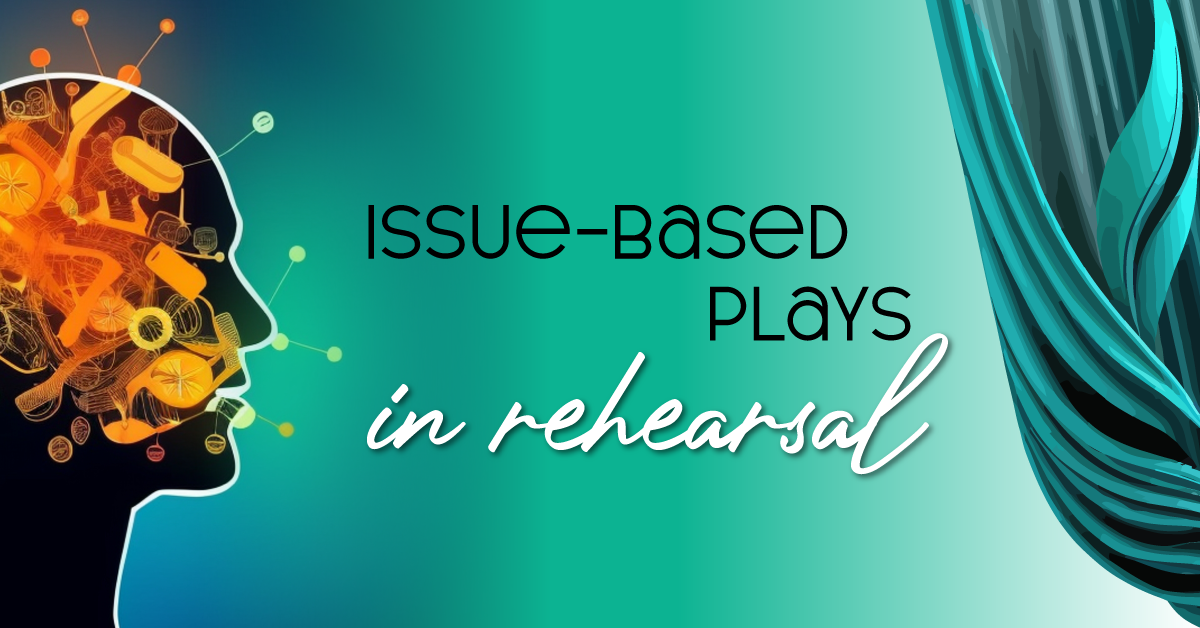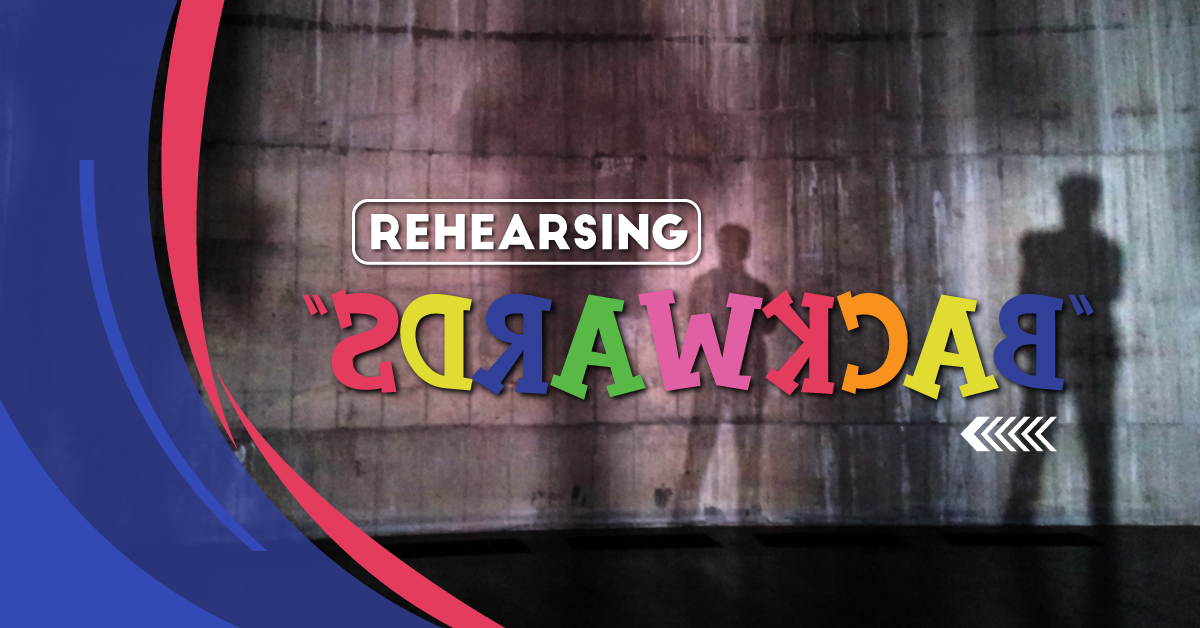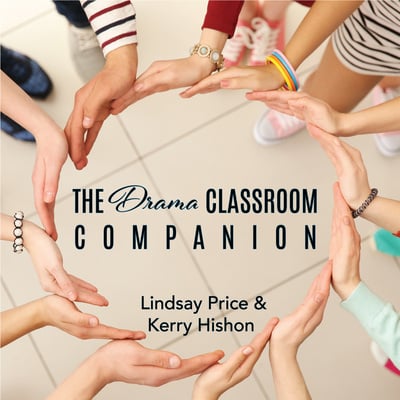Issue-Based Plays in Rehearsal
So you’ve chosen to produce an issue-based play with your students. Awesome! Issue-based plays are a great learning opportunity for your students and your audiences, as they tackle issues such as body image, racism, censorship, social issues, mental health, gender identity, and bullying in a theatrical manner.
Issue-based plays aren’t always heavy and serious — some are comedic, some absurd, some are musicals — but addressing serious topics is still a challenge, no matter the style or format. It takes a lot of mental and physical energy to tackle an issue-based play. Therefore, it’s imperative to take care of yourself and teach your students to take care of themselves throughout the rehearsal process. Here are a few practical tips for working on these types of shows in rehearsal.
1. Do check-ins and take breaks.
Self-care is important throughout any theatrical process, and that goes double for issue-based plays. Students may resonate deeply with the subject matter, which can feel heavy for them when they’re working on the material. Doing check-ins before, during, and after rehearsal (you as director with your students, students with their peers and scene partners, and you with yourself) can help to separate the real-life people from the characters, and remind students that they themselves don’t need to carry the burdens that their characters are holding.
It’s also helpful to take short breaks so everyone (students and staff alike) can rest and recalibrate during rehearsal. Try not to talk about the show during breaks; allow yourselves to fully separate from the work, even for a couple of minutes. If you’re worried about forgetting something important, write it down and come back to it when rehearsal starts again. Refresh yourself, reset, and re-enter the rehearsal space with renewed energy.
2. Shake up the energy.
While we’re on the subject of energy, we’ve mentioned that issue-based plays often “carry weight” or “feel heavy.” That can result in feelings of sluggishness, pacing issues, and low energy during rehearsals or performance. While it’s important to make an emotional impact through the performances, you don’t want the show to feel bogged down.
If you’re feeling this way, take a moment to shake up the energy. Try a verbal exercise such as doing a speed-run of the lines or saying each line like it’s a question, or a visualization exercise such as performing the scene while each character is floating in a pool, experiencing zero-gravity on the moon, or holding onto a high-powered helium balloon. Raise some energy by doing a stretch break, dancing like crazy for 30 seconds, or doing 10 jumping jacks. Even something as simple as opening some windows or turning on a fan can help alleviate feelings of weight. It might seem silly in the moment but can really help to lighten the mood. Our brains enjoy and often crave novelty, because it activates the dopamine system, which helps to raise our mood.
Additionally, be aware that plays that “feel heavy” can result in pacing issues. Check out our tips to address any potential pacing issues, and remind students to keep the energy flowing so it doesn’t drag down the running time of the show.
3. Use humour.
Sometimes you need a laugh to lighten the mood and ease the tension. I’m not saying to turn the show into a farce or let rehearsals devolve into silliness, but a well-timed joke or funny code word/phrase, when used sparingly, can be helpful. Even something unintentionally humourous can turn into an in-joke with the cast and crew, and become a useful tool in rehearsal.
Recently I directed Carrie: The Musical with high school students, which is based on the novel by Stephen King and deals with many difficult topics including bullying, violence, and death. At one rehearsal, we were rehearsing (spoiler alert!) the big, highly choreographed destruction scene at the prom. After running the section a few times, the students were clearly tired, so we took a short break. At the end of the break, I announced to them, “Ok, we’re going to run the scene a couple more times so please go back to your death positions!” For some reason, the students found that hilarious, and would use it as a recurring joke throughout the remainder of the rehearsal process: “Should we go to our death positions now?” “I don’t know if I’m in the correct death position,” and so on. It’s probably not funny to anyone who wasn’t there, but it helped us to lighten the mood when we were working on heavy material.
Don’t forget to include and enjoy humourous moments in the show as well. Even the most solemn and dramatic of plays will have moments of lightness and mirth. Lean into those moments; it’ll make the more serious moments even more effective.
4. Be available to answer questions and provide support.
As mentioned earlier, some students will resonate strongly with the topic of the issue-based play you’re working on. Students may have lived experiences that mirror the issues in your play. You may need to provide support for these students throughout the rehearsal process, such as physical resources or referring them to people who can provide guidance or counselling. As well, students may discover concerns or boundaries that arise during the rehearsal process that they didn’t expect. That’s ok, it’s a new experience. Just be ready to point students in the direction of support, and use self-care tools (breaks, check-ins, closure practices, etc.) to help.
Conversely, some students may not resonate with the material, and might require additional education on why the material in the play is important and relevant. Again, arm yourself with educational resources that you can share with these students. Do not depend on or expect any students with lived experiences to provide education or examples to other students, unless they volunteer to do so. It’s not their responsibility. As well, if you are aware of any students with lived experiences that they haven’t disclosed publicly, don’t share that information with other students or even hint that someone in the cast/crew is dealing with or has dealt with the issue. It’s nobody’s business, and unless that student wishes to share, it’s better to keep real life and the life of the play separate.
Related Articles
The Drama Classroom Companion
by Lindsay Price & Kerry Hishon
The Drama Classroom Companion is filled with articles and exercises to build the skills needed for theatrical performance as well as real world skills like creative thinking, critical thinking, collaboration, and communication.
The Rehearsal Companion
by Kerry Hishon
You’ve chosen the play, paid the royalties, done the script analysis, held your auditions, and cast the show. Tomorrow is the first rehearsal. Are you ready? Really ready? The Rehearsal Companion can help!





